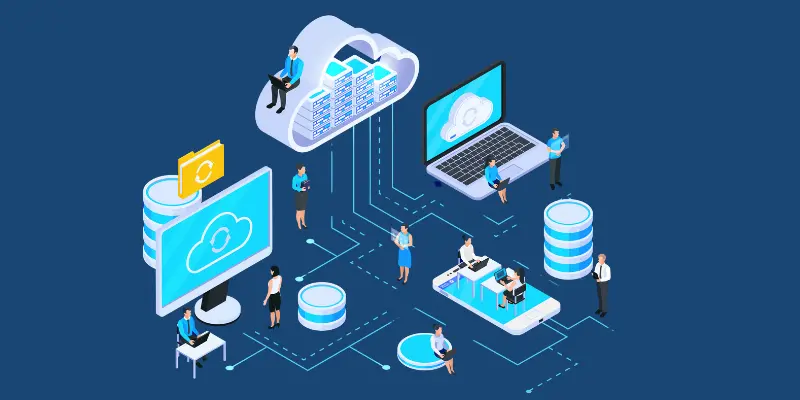Over 150,000 clients across industries rely on the Salesforce platform and Salesforce Customer 360 to run their companies effectively and successfully. What drives Salesforce's popularity is its hundreds of Salesforce experts, administrators, and developers. However, unlike Salesforce managers and consultants, who do not require coding to set up the platform, Salesforce Developer can improve the system in almost endless ways.
Additionally, Salesforce engineers use tools such as Visualforce framework Apex codes, Aura component, Lightning framework Web Services, SQL, Salesforce Object SQL Language (SOQL),Salesforce Object Search Language (SOSL),HTML, and JavaScript. In the tangled system of Salesforce development, the array of software and tools available to developers does not just provide nicety; it is the foundation of efficiency and creativity.
They range in the form of integrated development environments (IDEs) to cutting-edge tools for debugging. They are the blood that flows through the process of all projects, allowing developers to create complicated customer relationship management systems precisely and agilely. They're the partners in silence who streamline the deployment of code. They also help with version control and allow developers to create custom functions that help businesses grow. Salesforce Developers' proficiency in their tools isn't just beneficial. Still, developing solutions that are in tune with the client's demands and surpass expectations is essential. Knowing and using the available tools is crucial for Salesforce developers to enter the field.
What Is a Salesforce Developer?
A Salesforce developer (SFDC developer) is a full-stack programmer working on front and back-end capabilities and logic. Developers create software on Salesforce Platform (Force.com),Lightning App Builder, and Heroku. Additionally, Salesforce engineers use a broad range of tools like Visualforce framework Apex software, Aura components, Lightning framework, Web services, SQL, Salesforce Object Query Language (SOQL),Salesforce Object Search Language (SOSL),HTML, and JavaScript. Salesforce Freelance Developers can act as Salesforce development consultants, CRM developers, integration engineers, data migration programmers, or customization developers.
What Do Salesforce Developers Do?

Due to the broad range of analytical and technical capabilities, Salesforce developers can perform an array of consultancy and development-related services. These include:
-
-
Salesforce system review.
-
Design of a solution (architecting) and code review. This includes the aspects, constraints, and impact.
-
Implement batch classes that allow data transfer without being lost or corrupted.
-
It creates user-friendly, attractive, and visually pleasing designs with customized designs. It allows active versions of the elements when establishing them in the Lightning App creator.
-
Building Lightning Components via Lightning App Builder to facilitate component development.
-
Data set modeling, database deduplication, data queries from a custom object to an ordinary object, and execution of DML actions considering the governor limit.
-
Solving code coverage problems and writing test classes.
-
Custom objects can be created, including custom reports and dashboards that meet sales and marketing requirements. In addition to the current technologies, Salesforce developers looking to generate customized reports for their projects might benefit from integrating a comprehensive. NET reporting toolkit to enhance data visualization and presentation directly through C# .NET applications.
-
Custom controllers and extensions allow the creation of custom fields, the application of validation rules to new and existing objects, and the application of custom functions.
-
Administration of user Security roles at the application and system-level security levels. Single Sign-on configurations and custom security policies.
-
Created and developed Apex Classes, Controller Classes extensions, and Apex Triggers for many objects and programs to meet various needs.
-
The Salesforce Development Team integrates third-party software solutions that are used and operate on the client's system.
-
Understanding The Salesforce Developer's Toolbox
In the complex realm of Salesforce development, the tools and programs that developers can access provide more than just tools. They form the web that binds their daily tasks with the long-term vision. The tools increase productivity, speed up complicated processes, and allow developers to develop and personalize apps and connect them to the Salesforce platform more efficiently and accurately.
The tech landscape available to Salesforce Developers is rich and diverse, with various applications that help in development and project administration. Code editors aid in the creation of clear, effective code through collaborative platforms that facilitate the seamless flow of information between teams. The appropriate combination of tools could significantly influence the outcome of Salesforce initiatives.
Salesforce Tech Stack
Before knowing the Steps To Become a Salesforce Developer, discover the technology and tools Salesforce utilizes to create its products and sell and market its services.
Languages & Frameworks
They are the programming languages and frameworks utilized to create software. It covers various software applications, including web development, machine learning, and data analysis.
Development
These tools are essential to use during the entire software development lifecycle. It covers the areas of code control, version control, software, and software development and distribution. The tools are intended to improve efficiency, guarantee code quality, and enhance team participant collaboration.
Libraries
Libraries are collections of written code that developers can use to speed up the process and increase the reliability of their code. They offer ready-to-use solutions to basic programming tasks and specialize in specific frameworks or programming languages.
Application Hosting
App hosting platforms provide a flexible environment in which to run applications, such as web applications and microservices. These services manage the basic infrastructure and usually come with automated scaling, backup, and security capabilities, allowing developers to focus on their applications.
Data Stores
The category covers instruments and services for keeping, organizing, and analyzing data. These range from unstructured to structured data. They could be databases or data warehouse tools that can handle large quantities of data and frequently incorporate live analytics in real-time.
Application Utilities
The tools provide many solutions that improve the application's functionality and accessibility, such as API management, data caching, API management, and user authentication.
Analytics
The analytics tools collect, analyze, and report data on user engagement measures, traffic sources, and conversion and user engagement rates. They offer real-time information to analyze website performance, monitor user behavior, and allow data-driven decision-making to optimize your app and website.
Monitoring
Monitoring tools are crucial for monitoring the efficiency and condition of both infrastructure and software in various settings. They can provide immediate alerting monitoring, log analysis, and the ability to diagnose root causes.
Assets and Media
This includes software and platforms for managing and sharing digital media content, including images, videos, and audio files. They offer security-grade storage, quick retrieval, and more efficient distribution.
Design
The tools aid in creating and managing an item's multimedia and visual elements. They can be used for various tasks, from UX/UI development, prototyping, and designing graphics to editing videos. The platforms typically include tools for collaboration, including versioning, templates, and versions, which are helpful for both individuals and teams of collaborators.
Collaboration
Collaboration tools are created to aid effective team communication and collaboration across different platforms, such as video conferencing, chat, and file sharing. They help teams manage work, exchange information instantly, and share resources. They also streamline in-office and remote collaboration.
Communications
They facilitate various communication via digital media but are mainly focused on email. They have advanced capabilities to deliver and track the effectiveness of email marketing campaigns, including A/B test analysis, automation, and analytics, to increase delivery and engagement.
Marketing And Sales Tools
They provide a range of options designed to improve sales and marketing procedures. This category comprises customer relationship management (CRM) software to manage customer interactions and email marketing for targeted campaigns. It also includes SEO software to help improve website visibility and other platforms geared toward lead generation, analytics, and customer engagement.
Tools And Platforms Salesforce Developer Use

In addition to a general understanding of both back-end and front-end technology. Alongside general knowledge of front-end and back-end technologies, a Salesforce programmer must be proficient with Salesforce development tools and language, which include:
-
-
Integrated Development Environments (IDEs)
-
IDEs are vital to Salesforce Developers as they provide complete workspaces with the ability to edit code and debugging and deployment tools. These environments aid developers with writing code optimized for their needs, managing version control, and integrating into Salesforce instances, thus increasing quality and efficiency in coding.
Popular Tools
Visual Studio Code
An easy-to-use but robust editor for source code that can be used to support Custom Salesforce Development by extending it with extensions like Salesforce Extension Pack. It also offers tools like code completion and integration with Git control.
Illuminated Cloud
An IDE extension to JetBrains IntelliJ IDEA that offers robust Salesforce tools for development and capabilities such as deployment, code completion, and repository for source code integration.
-
-
Version Control Systems
-
Versioning control is vital to allowing Salesforce Developers to track changes in their codebases, mainly when working as a team. It ensures that all team members can work in different areas of the project without having to duplicate the work of others, which facilitates greater coordination and cooperation.
Popular Tools
Git
The distributed version control software permits Salesforce developers to keep track of their developments, return to a previous state, and work on the code seamlessly.
GitHub
Web-based hosting for managing version control with Git provides a graphic interface, access control, and a range of collaborative features.
Bitbucket
A Git-based source repository hosting service for code with public and private repositories. It also integrates with Jira and Trello to manage projects.
-
-
Continuous Integration/Continuous Deployment Tools
-
Tools for CI/CD are essential to making testing and deploying Salesforce apps easier. They allow developers to incorporate modifications more often and with excellent reliability. It ensures that every code change is checked and integrated without affecting the current functionality.
Popular Tools
Jenkins
An open-source automation system that assists Salesforce developers in implementing CI/CD practices by automating the tests, build, and deployment phase of their development process.
CircleCI
Cloud-based CI/CD system that seamlessly integrates with Salesforce and Salesforce, allowing automated tests and deployment pipelines that speed development processes.
Travis CI
GitHub's continuous integration platform is designed to develop and test software development projects hosted on GitHub. It also provides a complete service for Salesforce workflows that use CI/CD.
-
-
Test Automation Frameworks
-
Automation of testing is essential to Salesforce Developers, ensuring that the applications they develop and their customizations function according to their design. Frameworks that support creating, running, and managing automated tests. They aid in maintaining top-quality code as well as functionality.
Popular Tools
Selenium
An open-source framework to automate testing of web-based apps across different platforms and browsers typically used to test Salesforce applications.
Provar
An automation software designed to work with Salesforce supports many test types, such as integration, regression, and System testing.
ApexUnit
A robust testing framework designed for Apex code. It allows programmers to create and execute tests effectively to ensure high test coverage and quality.
-
-
Collaboration And Communication Tools
-
Collaboration and communication are keys to successfully completing Salesforce Development Solutions initiatives. The tools in this area enable teams to stay in touch, communicate, exchange information, and collaborate on projects and problems, regardless of location.
Popular Tools
Slack
An online messaging system integrated with Salesforce allows teams to collaborate in real-time, share files, and organize workflows within one unified area.
Quip
A Salesforce-owned collaboration tool that integrates spreadsheets, documents, and chat. It allows teams to collaborate in real-time documents inside Salesforce. Salesforce platform.
Chatter
Salesforce's native social network for enterprise facilitates collaboration and communication among team members. The platform includes options for users to interact and exchange information, such as feeds, profiles, and groups.
-
-
API Tools And Platforms
-
API platforms and tools are crucial for Salesforce Developers to develop tests, manage, and create APIs to Create Salesforce Solutions. They are also essential for integrating Salesforce with various other applications and systems. They aid in expanding Salesforce's capabilities and ensure seamless data and connections exchange.
Popular Tools
Postman
A well-known API development tool that enables Salesforce developers to develop documents, test, and create APIs quickly while also facilitating the process of integration.
Workbench
A compelling web-based suite of software designed to allow Salesforce admins and developers who want to connect with Salesforce using the API.
SOAP UI
An API testing tool for SOAP and REST APIs allows developers to examine calls, simulate requests, and test responses for Salesforce integrations.
Learning And Mastering Salesforce Developer Tools
For Salesforce Developers, the tools and programs you can master are not only devices to be used in your business; They are essential. Learning the right way to use the tools you use isn't just learning about their capabilities and functions but infusing them into the fabric of your skills in problem-solving. The key is to develop an approach to using these tools to their full capabilities, ensuring you're competent in your skills and creative and productive in your development processes. Learn how to begin this learning process and become proficient with the Salesforce Developer tools and software.
Establish a Strong Salesforce Foundation
Before diving into the details of a tool, it is crucial to grasp Salesforce's basic ideas and structure in depth. The knowledge gained from this foundation will guide the Software Development Company in exploring the vast collection of Salesforce software development. Use resources such as Salesforce Trailhead, official documentation, and Salesforce Developer forums to build an enlightened foundation.
Immerse Yourself In Hands-On Practice
Only theory can teach you much; the real skill requires practice. Begin by creating an organization for developers within Salesforce, which is available for free. You can utilize it to play around with the various tools, create mini-projects, and contribute to open-source initiatives. This hands-on learning approach will help you learn the specifics of every tool and how they could be used to tackle issues in the real world.
Participate In Developer Communities
Salesforce is home to a lively developer community with forums, groups, and other events allowing you to learn and exchange knowledge with your fellow developers. Participate in these forums for information, discuss issues, and keep up-to-date with developments and the best methods.
Utilize Official Salesforce Resources
Salesforce offers many learning resources, such as webinars, tutorials, and detailed documents. These resources are designed to help you understand each tool's features and optimal uses. Reviewing Salesforce Release Notes for each updated version is a good idea to ensure you are up-to-date.
Advanced Training With Specialized Training And certifications
Consider taking advantage of specialized training and accreditations to acquire tools essential for your job. Experienced instructors can help you gain a greater knowledge of features to create Salesforce Applications while showing potential employers that your skills have expanded over time. The Salesforce community highly values Salesforce certifications, and they may significantly boost your career.
Commit To Ongoing Learning
Salesforce is a constantly evolving platform that receives three significant updates every year. For your platform to remain efficient, it is essential to commit to ongoing learning. Follow Salesforce blogs, sign up for developer newsletters, and learn about the latest features and changes regularly.
Teach Others And Solicit Feedback
One of the best methods to build your expertise is to share the lessons you've learned. Whether through blogs, speaking to group meetings, or even coaching, sharing your knowledge will help improve your understanding. In addition, get opinions on your efforts to identify areas that could be improved and new ways to use the tools. If you follow these guidelines, Salesforce Developers can be taught and master these tools and applications essential to their work. The strategic learning method ensures you stay current with the Salesforce environment and are ready to innovate and take the lead.
Conclusion
Salesforce can also be a fantastic platform that facilitates IoT (Internet of Things) development. It can build Bots using Einstein and Apex and integrate them into external applications such as Facebook Messenger, Amazon Alexa, and Slack. This is an excellent feature of Salesforce: it's a seemingly infinite platform always evolving and growing, providing a constantly expanding environment for developers to use and profit from. This, however, presents an issue.
Understanding the Custom Salesforce Development Services world will prepare aspiring developers for technology challenges ahead of time and indicate their expertise to prospective employers. It's the base on which successful careers are built and transforms novices into skilled professionals capable of mastering the intricacies of the Salesforce platform. Professionals with years of experience and those who are new to the field. This knowledge can be an effective way to differentiate yourself in an industry where mastery of the developer tools is correlated with the capability to produce outstanding results within the framework of Salesforce.













Share this blog